

This collection of resources offers information on students' right to read and steps to take to report challenges. In addition, this collection offers information about both the importance and potential detrimental effects of Internet filtering on student learning. Libraries and Intellectual Freedom - The First Amendment Encyclopedia. The First Amendment’s right to freedom of expression encompasses intellectual freedom, which includes an individual’s right to receive information on a wide range of topics from a variety of viewpoints.
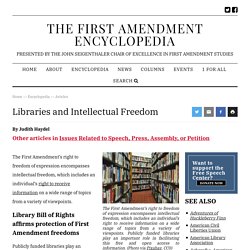
Publicly funded libraries play an important role in facilitating this free and open access to information. (Photo via Pixabay, CC0) Access to Resources and Services in the School Library: An Interpretation of the Library Bill of Rights - ALA. The school library plays a unique role in promoting, protecting, and educating about intellectual freedom.
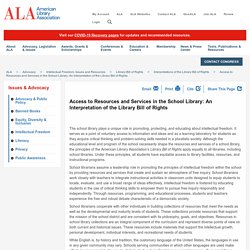
It serves as a point of voluntary access to information and ideas and as a learning laboratory for students as they acquire critical thinking and problem-solving skills needed in a pluralistic society. Although the educational level and program of the school necessarily shape the resources and services of a school library, the principles of the American Library Association’s Library Bill of Rights apply equally to all libraries, including school libraries.
Under these principles, all students have equitable access to library facilities, resources, and instructional programs. The Students' Right to Read - NCTE. Filters and Filtering - ALA. The use of Internet filters to block constitutionally protected speech, including content on social networking and gaming sites, compromises First Amendment freedoms and the core values of librarianship.
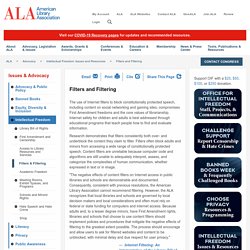
Internet safety for children and adults is best addressed through educational programs that teach people how to find and evaluate information. Research demonstrates that filters consistently both over- and underblock the content they claim to filter. Filters often block adults and minors from accessing a wide range of constitutionally protected speech. Content filters are unreliable because computer code and algorithms are still unable to adequately interpret, assess, and categorize the complexities of human communication, whether expressed in text or in image. Internet Safety for Schools - Scholastic. Internet Filtering Product Guide Schools' and parents' concerns about safe surfing have created a market for products that allow Internet users to control the kind of content they receive on their computers.
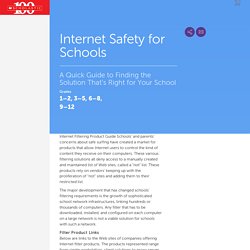
These various filtering solutions all deny access to a manually created and maintained list of Web sites, called a "not" list. These products rely on vendors' keeping up with the proliferation of "not" sites and adding them to their restricted list. The major development that has changed schools' filtering requirements is the growth of sophisticated school network infrastructures, linking hundreds or thousands of computers. Any filter that has to be downloaded, installed, and configured on each computer on a large network is not a viable solution for schools with such a network. Filter Product LinksBelow are links to the Web sites of companies offering Internet filter products. Filtering Beyond CIPA - Knowledge Quest.
Classroom Libraries Are For Reading, Not Censorship. By: Jamie Gregory When I was a classroom English teacher, I would try to find cheap books for young adults or buy books I’d read that I loved.
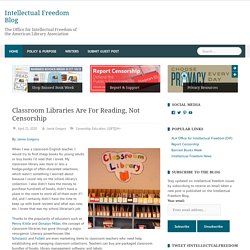
My classroom library was more or less a hodge-podge of often-discarded selections, which wasn’t something I worried about because I could rely on the school library’s collection. I also didn’t have the money to purchase hundreds of books, didn’t have a place in the room to store all of them even if I did, and I certainly didn’t have the time to keep up with book reviews and what was new, etc. I knew that was my school librarian’s job. Thanks to the popularity of educators such as Penny Kittle and Donalyn Miller, the concept of classroom libraries has gone through a major resurgence. But what about the more nuanced aspects of librarianship that don’t easily transfer to the classroom? In part, what differentiates school librarians from classroom teachers is explicit training in anti-censorship ethics. “III. Jamie M. Librarians Beware: Self-Censorship - Intellectual Freedom Blog.
By Andrea Jamison “Conformity is perhaps natural to a time of accelerated change.
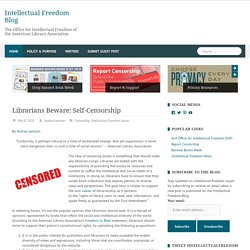
And yet suppression is never more dangerous than in such a time of social tension.” – American Library Association The idea of censoring books is something that should make any librarian cringe. D.I.Y. Censorship - School Library Journal. Banned Web Sites: Are Your Policies Up-To-Date? - Knowledge Quest. In looking over an assignment to develop a library reconsideration policy that I gave to my graduate students, it occurred to me that an important information element is missing.
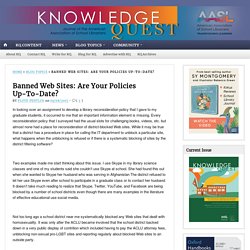
Every reconsideration policy that I surveyed had the usual slots for challenging books, videos, etc. but almost none had a place for reconsideration of district-blocked Web sites. While it may be true that a district has a procedure in place for calling the IT department to unblock a particular site, what happens when the unblocking is refused or if there is a systematic blocking of sites by the district filtering software? Two examples made me start thinking about this issue. Selection & Reconsideration Policy Toolkit for Public, School, & Academic Libraries - ALA. "The library is a growing organism" S.R.
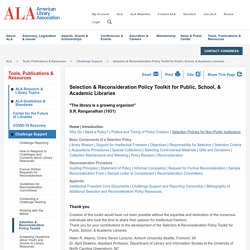
Ranganathan (1931) Home | IntroductionWhy Do I Need a Policy? | Politics and Timing of Policy Creation | Selection Policies for Non-Public Institutions. Reporting Challenges: A Quick How-To Video. How to Report a Challenge (ALA OIF) SC School Challenge Form. Book: Intellectual Freedom Manual, Ninth Edition - ALA. Book: Protecting Intellectual Freedom and Privacy in Your School Library by Helen R. Adams - ABC-CLIO. April 2013.
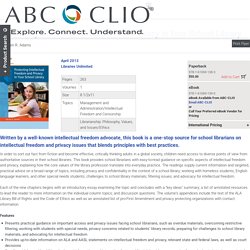
In the News: Marginalizing the marginalized with Internet filtering - Knowledge Quest. Posted on behalf of Doug Johnson for Banned Websites Awareness Day High school student Rachel is increasingly concerned over racial issues in her community and plans to write her senior thesis on this topic.
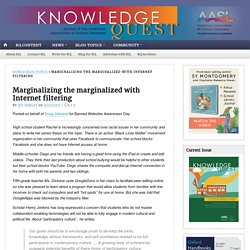
There is an active “Black Lives Matter” movement organization in her community that uses Facebook to communicate. Her school blocks Facebook and she does not have Internet access at home. In the News: Internet Filtering at Schools Is Problematic - The Atlantic. New research released this past February echoes these students’ sentiments. A team from Sesame Workshop’s Joan Ganz Cooney Center, a nonprofit research lab, and Rutgers University conducted interviews on digital equity with 170 Mexican-heritage parents and children in three states—California, Colorado, and Arizona. All of the youngsters were enrolled in high-poverty school districts. Vikki Katz, an associate professor of communication at Rutgers and the study’s co-author, said school-supplied laptops were usually not the only digital device in these families’ homes, but emphasized that “the poorest families are least likely to have other devices.
Districts filtering content means that those children and families don’t get the same Internet as their more privileged counterparts.” In the News: Filtering: The Critical Difference between “All” and “Most” - Knowledge Quest. One of the nine common beliefs set forth in the AASL Standards for the 21st-Century Learner is as follows: “Equitable access is a key component to education. All children deserve equitable access to books and reading, to information, and to information technology in an environment that is safe and conducive to learning.” Yet due to overly restrictive and excessive filtering in our schools, we fall short of realizing this belief. As we celebrate Banned Books Week and the freedom to read, we focus on Banned Websites Awareness Day and the “overly restrictive blocking of legitimate, educational websites and academically useful social networking tools in schools and school libraries.” Let’s face it: we have several issues here.
In the News: Up to the Challenge. When I worked as a school librarian at Little Elementary in Arlington, Texas, I was terrified of having a book challenged. Sometimes I would wake up at night worrying. I was afraid a parent would be angry with me, and my principal would think I was a bad librarian. If you ever find yourself wide awake and troubled about possible challenges: Get out of bed, drink some water, and remember that you have nothing to fear—if you’re prepared before a complaint occurs. Build your foundation The first step is to be an excellent educator. The second step is to find the section in your district’s school library handbook on reconsideration of school library materials. In the News: Librarians could be jailed and fined under a proposed censorship law.
A bill pending in Missouri's legislature takes aim at libraries and librarians who are making "age-inappropriate sexual material" available to children. The measure, championed by Ben Baker, a Republican lawmaker, calls for establishing review boards who would determine whether materials in libraries contain or promote "nudity, sexuality, sexual conduct, sexual excitement, or sadomasochistic abuse. " In addition, the boards, which would be comprised of parents, would root out materials lacking "serious literary, artistic, political, or scientific value. " Librarians who defy the review boards by buying and lending such materials would be subject to misdemeanor charges, fines upward of US$500, and a potential jail sentence up to one year.
As a librarian, and now as an educator who teaches aspiring librarians, I see this bill as the latest chapter in a long history of books being banned from public and school libraries. Censorship and book banning J.K.